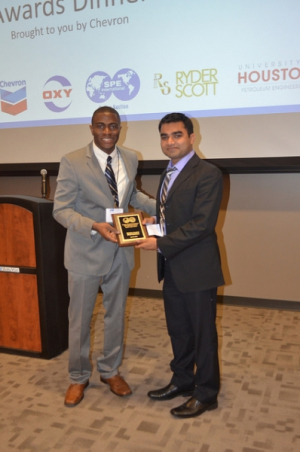Rahul Pandey, a Ph.D. student studying chemical and biomolecular engineering at the University of Houston Cullen College of Engineering, took home a third place prize from the UH-hosted Society of Petroleum Engineers (SPE) Gulf Coast Regional Paper Contest.
SPE is the primary professional organization for petroleum engineers around the world, with the Gulf Coast Section of SPE alone boasting more than 16,000 members. The mission of the SPE-GCS is to enhance technical knowledge among its members, promote professional development and networking in industry, support local education initiatives and perform community service in the Greater Houston area.
The UH student chapter of SPE is particularly active, especially since the relaunch of the undergraduate program in petroleum engineering in 2010. Since then, UH-SPE students worked tirelessly to organize and host the SPE Gulf Coast Regional Paper Contest on the University of Houston campus.
Out of the hundreds of students who entered the contest, only three winners were chosen for each division (bachelor’s division, master’s division and Ph.D. division). “Rahul was the only UH student to win a prize, and he did an excellent job,” said Tom Holley, director of the petroleum engineering program at the Cullen College of Engineering.
Rahul’s paper, titled “Flow and dynamics of particulate fluids in complex porous media,” sought to determine the phase behavior and flow properties of particle-polymer mixtures in fine geometries. This research is particularly important to the oil and gas industry, Rahul noted, where understanding the flow of drilling fluids through porous media (such as rock structures) is crucial to the success of a drilling operation.
Working closely with Jacinta Conrad, assistant professor of chemical and biomolecular engineering at the Cullen College, Rahul was able to show that small changes in the size, concentration or interaction of particles can affect the properties of a fluid dramatically. “It completely changes flow properties, which then affects drilling operations,” he explained.
Based on this initial research, Rahul then developed theories which could explain how certain interactions between particles can impact the overall flow properties of a fluid.
According to Rahul, who currently serves as an intern at Shell, there’s no better place than Houston to work as a chemical engineer. “Houston is the best place to be, and chemical engineering at UH is one of the best programs in the world,” he said, adding that staying in the city of Houston has allowed him to remain involved in both academic research as well as private industry.
“Being in Houston is very positive for people who want to be in industry but also want to remain connected with academia. I always feel welcome when I come back to the [Cullen] College and it will be easy to stay in touch with the research and academic side. I’ve developed a lifelong relationship with my engineering professors, especially Dr. Conrad, and I don’t want to lose touch with the engineering sciences I fell in love with.”
According to Conrad, the feeling is very mutual. “I’m extremely proud of Rahul. In fact, he is such an integral part of my lab that one of my current research projects is built off his preliminary work. He took preliminary data on larger channels and ultimate larger particles to show that making particles sticky reduced one of the mechanisms that changed density during flow,” she explained.
